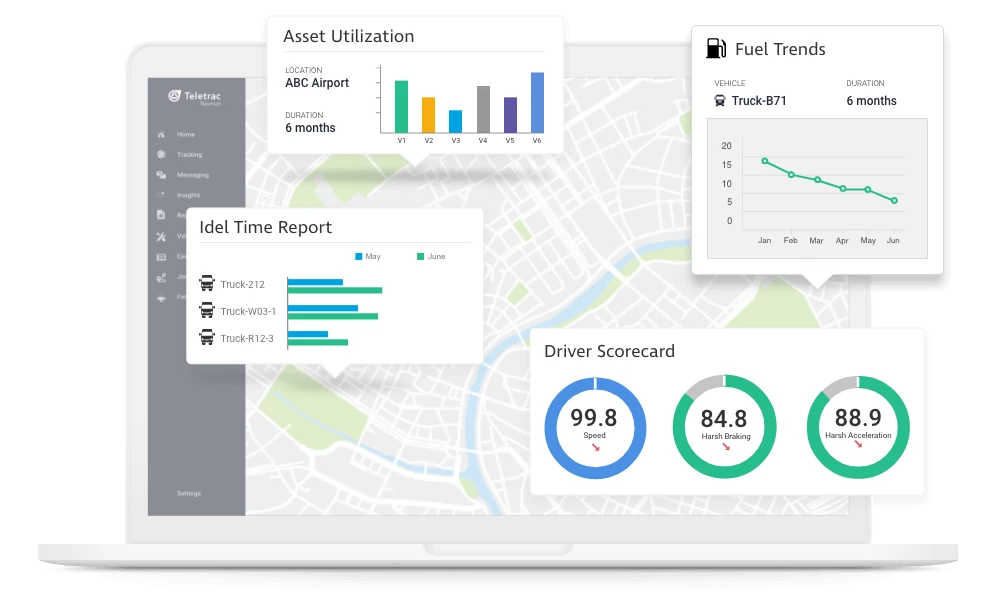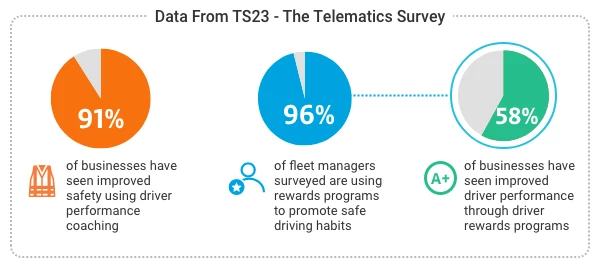Key Takeaways
Effective fleet management requires actionable data. For this reason, data aggregation plays a crucial role in helping fleet operations to optimize performance. This is especially true for mixed manufacturer fleets where different telematics systems make it difficult to get a comprehensive view of fleet performance.
In this guide we explore how fleet data aggregation simplifies accessibility and take a look at the data communication standards that enable data aggregation, as well as the best practices for extracting value from fleet data.
Table of Contents
- Understanding Fleet Data Aggregation
- Simplifying Fleet Data Aggregation
- Using Fleet Management Analytics to Gain Competitive Advantage
- Optimize Fleet Management Data Analytics
Understanding Fleet Data Aggregation
The process of data aggregation brings together large volumes of raw data from multiple sources into one location for statistical analysis. This can often be challenging for fleet operators that manage a wide range of vehicles and equipment that all run on different telematics platforms. This is the challenge that the Association of Equipment Management Professionals (AEMP) standard, and the Fleet Management Systems Interface (FMS) standard were designed to help overcome. These standardized interfaces enable data to be retrieved and analyzed from a wide range of vehicles and equipment manufacturers.
AEMP Telematics Standard
The original AEMP standard was introduced in 2010 with a snapshot of up to five telematics data fields. While this offered some measure of visibility, the data set was limited. Over time, the AEMP standard evolved through multiple iterations with increasingly comprehensive data aggregation. In 2016, the International Organization for Standardization (ISO) published the AEMP Telematics Standard as ISO 15143-3.
FMS Standard for Commercial Vehicles
The FMS Standard 1.0 was issued in 2002 and supported basic vehicle information, such as speed, fuel consumption and total engine hours. The standard aimed to enhance operational efficiency, safety and data management for fleet operators by providing real-time information about operations. The standard continued to evolve over the next two decades, and the most recent version, FMS Standard 4.0, was issued in 2017.

Simplifying Fleet Data Aggregation
The evolution of the FMS and AEMP standards has allowed fleet management software to help businesses aggregate data and gather the insight they need to effectively manage their resources. By capturing data from manufacturer installed or dedicated devices, all fleet data can now be aggregated into one platform in real-time. With instant access to data through reporting, dashboards and alerts, all team members can make quick, data driven decisions.
The latest solutions now offer wider data aggregation, pulling in data through integrations with other software platforms and also driver applications.
Using Fleet Management Analytics to Gain a Competitive Advantage
Utilizing fleet data analytics not only improves fleet operations, but it also gives your business a competitive edge . With the insights gathered from data aggregation, fleet managers, owners, and other stakeholders can make informed decisions about business operations. By analyzing key performance indicators like equipment utilization rates, idle times, and route efficiency, fleet managers can identify opportunities to reduce operational costs, eliminate underutilized assets and increase overall fleet productivity. Here are three areas of competitive advantage that can be achieved:
Improved Fleet Maintenance
Improved fleet maintenance is one of the primary ways in which fleet managers can use fleet data analytics. By actively monitoring equipment health, engine diagnostics, and maintenance schedules, fleet managers can follow regular maintenance intervals and address small problems before they turn into large ones. Timely maintenance reduces the risk of breakdowns, extends asset lifespan, and minimizes costly repairs. Fleet maintenance software can also enhance planning accuracy by identifying patterns and predicting potential equipment failures.
Driver Safety and Risk Reduction
Fleet data analytics provides an excellent return on investment with improved driver safety and risk reduction. Driver scorecards can measure driver behavior data, and poor driving habits like speeding, harsh braking, and excessive idling can be identified as areas for improvement. From there, better habits can be reinforced through targeted driver training programs.
Accurate fleet data can also be used to create effective commercial driver safety programs to incentivize proper driving behavior and reward high-performing drivers. These programs have proven effective, with 91% of businesses in the TS23 Telematics Survey reporting improved safety using driver performance coaching.
Additionally, 96% of respondents reward better driving performance. These performance-based bonuses were cited as a key method organizations are using to retain drivers in the midst of the global driver shortage.

Improved Customer Satisfaction
One often overlooked benefit of fleet data analytics is enhanced customer satisfaction. Real-time data analysis enables fleet managers to make proactive decisions about route optimization and dispatching, which can directly impact delivery times and reduce delays. This increased transparency into fleet operations can improve customer satisfaction and loyalty, ultimately boosting company reputation and revenue. By leveraging fleet data analytics to improve delivery processes, companies can differentiate themselves from competitors and meet customer demands more efficiently.
Optimize Fleet Management Data Analytics
Fleet data aggregation can revolutionize your business operations by simplifying data accessibility, promoting cross-functional collaboration, and enabling data-driven decision-making. However, integrating fleet management software can be challenging without the right software provider.
Our fleet management platforms are customizable and have been designed to help businesses running mixed fleets get the insight they need to improve performance. Our software has a strong data aggregation capability and analytics tools that simplify data interpretation, so you can start making data-driven decisions straight away.
To learn more, contact our team of product experts. You can also build your custom solution in just 30 seconds with our online tool.

